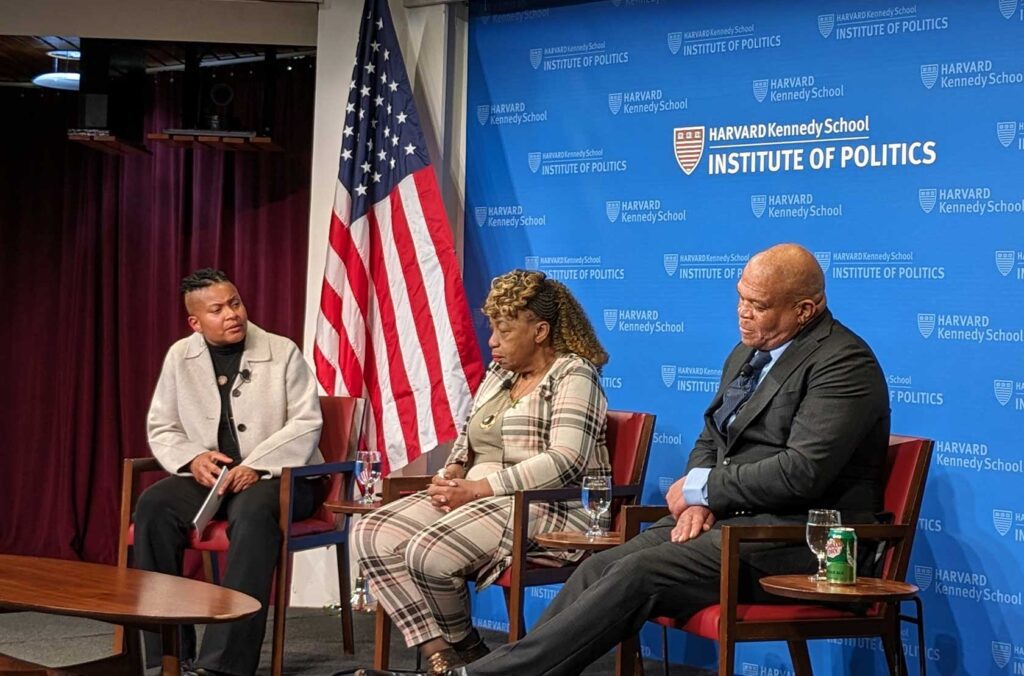
It’s been four years since the nation erupted in protest following George Floyd’s murder by police in Minneapolis.
But Selwyn Jones, Floyd’s uncle, has found a way to help achieve some good out of the national rage and his immense personal grief.
With the understanding that further violence would only make a bad national situation worse, he co-founded the Hope929 Foundation, a charity that advances civil rights and positive social change, in honor of his nephew, who was held down by police for a harrowing nine minutes and 29 seconds
Jones appeared with Gwen Carr, the mother of Eric Garner, at “Channeling Grief Into Activism,” a forum held April 18 at the Harvard John F. Kennedy Institute of Politics.
On May 25, 2020, Floyd, 46, was killed while in Minneapolis Police custody in a gruesome encounter that was captured on video, most notably by 17-year-old Darnella Frazier. Her video showed Floyd calling for help and officer Derek Chauvin pinning Floyd down with his knee on his neck for what turned out to be nine minutes and 29 seconds.
In an adjacent room prior to the symposium, Jones told the Bay State Banner how he had first learned about the killing, and how he reacted. Sitting nearby wearing the faces of understanding were Dinetta Scott and Gwen Carr.
“It was 7:30 a.m. and I was just getting my kids ready for school,” Jones, a North Carolina native, began. He had turned the TV news on. “It was the last day of school and Ahmaud Arbery had just been murdered” by three white men while jogging in southeast Georgia, “so that was still on my mind, and when I looked at the television and I see this dude on the ground and it was just chaos, and I’m thinking, you know, ‘Wow, why don’t they stop killing Black people, man? Why did they got to do this?’”
Then, his sister called.
“She said, ‘Did you see what the police did to George?’” Jones continued. “I set my phone down and I just went into total silence, and I just looked at the television and I waited, just like everybody else.”
The next day, Jones saw the video that showed it all.
“And you waited for him to die,” he recalled. “Then everything that’s ever been said to me and every bad thing that’s ever happened to me, it just came into my brains. Everything that happened when I was a kid — any racist, bigoted dislike, hatred, because of the color of one’s skin.”
He continued, like it was yesterday. “It just hit me right in the face and as of that day, I have lived a different life. My whole thought process changed, and it wasn’t like it was. How can I move forward from that point, you know?”
Scott and Carr know. In 2012 Scott, who lives in Seattle, lost her son, Army Sgt. James Brown. Brown, who served two tours of combat duty in Iraq, was fulfilling a weekend sentence for a DUI conviction; his death was later ruled a homicide due to restraints by the county forensic pathologist.
And Carr, of Brooklyn, lost her son Eric Garner, whose 2014 death for illegally selling cigarettes shocked the nation.
One officer locked Garner in a chokehold, which was against NYPD policy. It was then that Garner, pinned to the ground, uttered his bone-chilling last words that morphed into a slogan of the Black Lives Matter movement: “I can’t breathe!”
Garner’s death was ruled homicide by suffocation by the medical examiner.
Also sitting nearby was Liz Darden, co-founder and CEO of Hope929 and an educator and city councilor in Harrison, Arkansas, which, due to its history as the KKK headquarters, has the dubious moniker “the most racist town in America.”
Channeling grief into action
During the initial heights of the coronavirus pandemic, the George Floyd killing ignited mass protests, first in Minneapolis and then nationwide, and that anger has not subsided.
Although Chauvin was convicted of murder in April 2021 and sentenced to over 20 years in prison, and former officers Thomas Lane, J. Alexander Kueng and Tou Thao were sentenced to several years in prison for aiding and abetting murder, that doesn’t erase the anger, the pain and the suffering of family members left behind.
But Jones has carried on in a more proactive and peaceful direction.
“I was having a conversation on the phone one day about letting victims’ voices get heard,” he told the Banner. “Because of the platform that I inherited, and because I knew a lot of people like Dinetta Scott and Gwen Carr. And because there’s so many Eric Garners and there’s so many George Floyds.”
Jones’ and Darden’s foundation connects families to attorneys to help reopen their cases, while tackling broader challenges.
“We are trying to implement solutions to societal problems,” said Darden. “We work with tribal reservations to institute reintegration programs and lend tools for financial literacy.”
“There’s no support tools,” Jones said. “And so we’re here today at Harvard to have these discussions, to hopefully compel the audience to at least if they see something, say something, because silence is just perpetuating this.”
Carr told the Banner that not all families get a platform. “There’s so many similar tragedies that never have any media, never have any time on TV or whatever,” she said. “So as mothers or as family we have to reach out, like myself.”
She does — all over the nation, with annual events that bring mothers together. “We try to empower and let them know what our journey has been, and tell them that they must speak their child’s name.”
Carr raises funds to support days of relaxation and talk. “We all want to talk about our loved one as a person and not as a news story,” she continued. “We want to say how silly they were, what their interests were, what were their favorite sports?
“We have to try to keep our child’s name alive.”
On July 17, 2014, Carr, who was a New York City train operator, was on her Coney Island to Astoria Boulevard route. During her 30-minute break she got her phone, which was filled with calls. On the next ring, a friend told her that they didn’t have firsthand information, but had heard that Eric had an interaction with the police.
Carr called her husband and asked him to wait until she was back in Coney Island. “I thought I had a better chance of taking the train back, and I’d be close to home.”
She left work, telling personnel that something had happened to her son. When she got to Coney Island, her husband was waiting. As soon as she got in, he put the child locks on the car, and she prodded him for information. Finally, he broke down. “He said ‘Gwen, Eric is no longer with us,’ and I think I lost my mind at that moment. I remember trying to kick the windows out.” She said that in her state, she thought that she could get to Staten Island faster by running.
He told her they would be home soon, but he did not want her to go to the hospital. “He said that would be too much for me,” she said.
Her brother-in-law came over. “We all went to the hospital and then I came back home and I just didn’t want to talk to anybody,” Carr continued, as a reporter held her arm. “I was in a very dark place, and then I was informed that the news media wanted to come to the door.”
After some time, she agreed to speak to one reporter. “And it turned out that we spoke to the right one, which was the Daily News, as they had the exclusive on what actually happened to Eric.”
They promised a video and said it would be ready at 5 a.m. “It’ll be frame by frame of what happened,” the reporter told her. “And then at 7,” the reporter added, “It’s going to go viral on TV.”
Carr still did not exactly know what had happened. But the next morning, her brother-in-law brought the paper. “Oh, that made me crazy again, to show what they did to him,” she said. And then as they said, at 7 it was on the news.
“And to this day I have not looked at the video in its entirety,” Carr said. “I don’t know how I could. I don’t look at it, because when I first started seeing it on TV, I was just yelling at the screen, telling them, ‘Just leave him alone! Get off of him!’ And my husband cut the TV off.”
She hasn’t viewed it since. If she attends an event where it is playing, she leaves the room. Ten years on, she still can’t.
When Floyd was killed, a reporter contacted her, asking for her reaction. “He said ‘Well, I’m going to send you the video, and I’m going to send you the article.’” she recalled. “I said, ‘Send me the article. Don’t send me the video.’”
At the symposium, filmmaker and Harvard grad student Brad Bailey praised Carr’s perseverance. “I’ve seen her speaking at a public enterprise, pushing for accountability within the New York City Police department, and holding a Zoom call with Joe Biden,” he said in his introductory remarks. “She has led a speech outside City Hall. She successfully led the June, 2020 passage by the New York State Assembly of the Eric Garner Anti-Chokehold Act,” which created a new crime of aggravated strangulation.
Enduring memories and sorrow
Jones said that George Floyd loved basketball and football.
Carr said that Eric was her eldest son and was a joy. She told funny stories about his enthusiasm for people, his looking out for his younger siblings, his helping out the poor and hungry. Theirs was a very close extended family who lived mainly on the same street.
“He was a good son and a big joker,” she said. “He was a big New York Giants fan, even though they always lost.”
Carr said she recalled police at her schools and always had a good relationship with them. When she and her friends would misbehave, they would see the policeman and go right back into the building. There was never a problem, she said.
“Growing up in Brooklyn was different than the people who grew up in the South,” she said. “I went to school with everybody – with Irish, Italian, Puerto Rican, Jewish kids. Everybody was in my class if they attended the public school. So I wasn’t exposed to racism, as in the South.”
Now, however, she said Brooklyn was far more segregated. “I wonder why, as I didn’t do that.”
She recounted that dreadful day of Garner’s death, stating that she just wanted to go to sleep and not wake up until the nightmare was over. But it was never over.
“What I decided to do was to turn my mourning into a movement, and turn my sorrow into a strategy,” she said to loud applause.
Carr said that once she came to grips with what had happened to her, she found that there were thousands of mothers around the country going through the same thing in different ways, some challenging.
“They are in bed. They can’t get out of it. You find someone taking strong medication. Some are in the hospital and others are even attempting suicide after the loss of their child,” she said.
“When we lose a child, and if they weren’t doing anything, weren’t causing a threat … no matter what race you are, and no matter what religion you are, we are all human, and we all want safety for our children,” she added, again to applause.
“That’s why I fight for my children as well as your children, and don’t be like me, waiting until it knocks on my door,” she said. “You have to do something before it happens.”
The work continues
Moderator Sandra Susan Smith, Daniel and Florence Guggenheim Professor of Criminal Justice at the Harvard Kennedy School, noted that in the 10 years since Garner’s death, U.S. police have shot and killed over 10,000 people, 27 percent of whom were Black.
“We have lost 18-year-old Michael Brown, Freddie Gray, Breonna Taylor, Tyre Nichols and so many others since Eric’s death. And further, we know that Black people are significantly more likely to be killed,” said Smith, who also is director of the Malcolm Wiener Center for Social Policy and faculty chair of the Program on Criminal Justice Policy and Management.
Jones added, “The problem, of course, is that we live in a culture that teaches us to ignore pain and suffering, to ‘man up,’ to move on and get on with it. [But] when we deny our grief, we also deny our humanity.”
He and Carr work to prevent counterviolence, as they themselves have.
“I’ve heard people say ‘You know if that happens to me, I’ll just go shoot up the police station.’” Carr gets that, she said.
“If I had been there when they were killing my son, they would have had to kill both of us, because there’s no way that I would have stood by and let them hurt my son the way that they did,” she said.
But she said that she also thanks God. “He gave me the wisdom to go the route that I am going now instead of going to violence. And you know, with spontaneous combustion, when it explodes you don’t know where it’s going to go.”
She and Jones discussed “the talk,” when parents tell their kids to protect themselves by being polite and cooperative. Yet, they know that kids can get destructive and do stupid things that are not right.
“When confronted by police, yes, we should be disciplined for it,” Carr said. “But not killed for it.”
Jones said that in the town he lives in, a Confederate flag was removed, yet his neighbors are wary of speaking to him because of his activism.
“Imagine having to know that somebody that didn’t have any passion or caring decided they would be judge, jury and executioner, and one day decide if that was your day. Imagine that this is what we go through every day,” he said.
“I am comfortable with my activism because I hope that it changes lives,” he added. “Some of us are writers. Some of us are poets. Some are marchers and some like letters. I just can’t sit by and see children and men and women being taken away for no reason and just treated as another news story.”
Both called for an end to the “blue wall of silence,” because all lives matter, and Black lives matter. “We want to live also,” Jones said.
A Harvard student asked what they thought that he and his classmates could do.
“Have a voice,” Jones said. “But to come from the voice of Harvard University … when somebody killed your little boy, he lost his life, but he didn’t have a voice. And you have to be the voice for the voiceless and be a part of the fight – because your success starts where your comfort zone ends.”
Another student asked how to extend the activism and reaction following the George Floyd killing, so that it would not be a transient moment.
“Everybody came out and they contributed, but you notice how it dwindled down,” Carr said. “So it was like they were in a moment, not a movement … In a movement, you move. You keep moving toward the goal of what you’re trying to accomplish.”
She said it was not about demonstrating and then going home to watch it on the news. “You know, we go from demonstration to legislation,” she said, to applause. “This is how we make a change.”
Jones ended with a call-out to the students. “One day in the future, you’re going to make this world a better place. You are changemakers,” he said. “We’re entrusting you to become lawmakers, to become all types of politicians and to make your life decisions with your heart as much as you do with your head.”

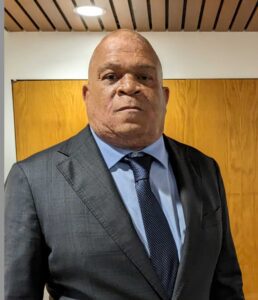
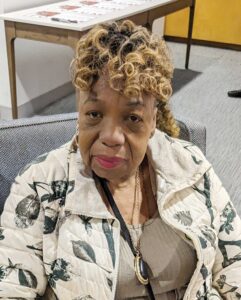
![Banner [Virtual] Art Gallery](https://baystatebanner.com/wp-content/uploads/2024/05/Breathe-Life-4-ToGetHe_WM-150x150.jpg)
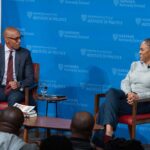


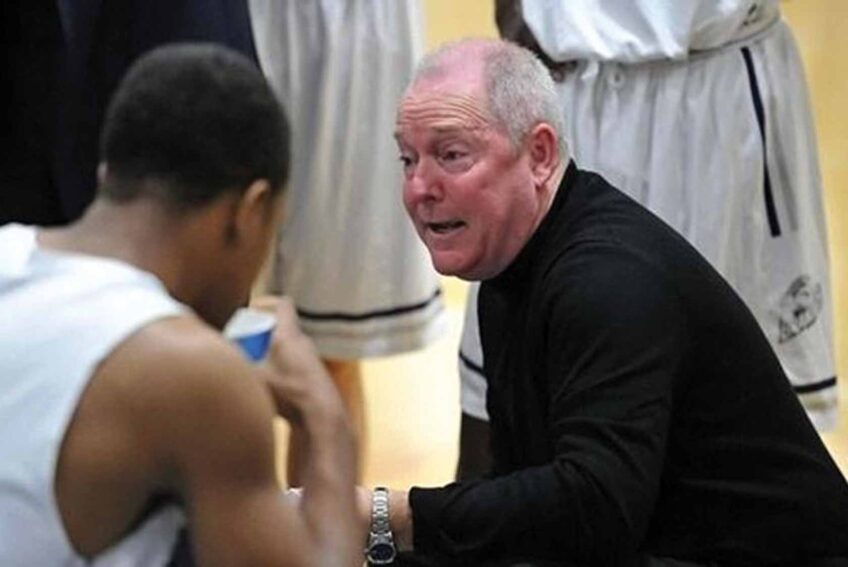
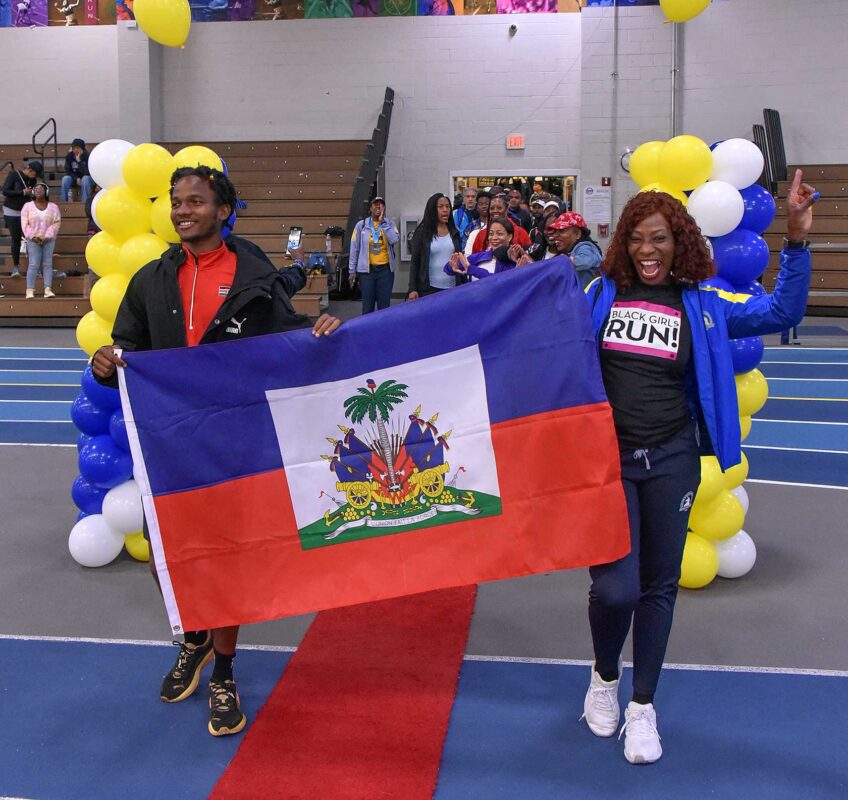
Leave a Reply
You must be logged in to post a comment.